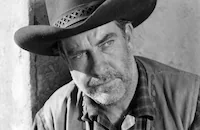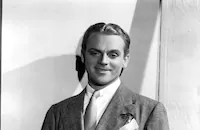Other Men's Women

Brief Synopsis
Cast & Crew
William A. Wellman
Grant Withers
Mary Astor
Regis Toomey
James Cagney
Fred Kohler
Film Details
Technical Specs

Synopsis
Bill, a railroad engineer, has no intention of getting married and settling down. When Marie, a waitress in the depot cafe, reminds him that they are supposed to get married that weekend, he pretends to have something else to do. She is angry and breaks off their relationship, much to Bill's relief. When Bill is thrown out of his boardinghouse for drunkenness and non-payment of rent, Jack, his partner, brings him home. Bill thinks that Jack's wife Lily will hate him because he is drunk, but she welcomes him and makes him comfortable. For a time the three of them are happy together, but one day, while Jack goes out for ice cream, Bill and Lily acknowledge that they love one another. Bill wants to tell Jack right away, but Lily is afraid to hurt him. Bill moves out, without saying why, although Jack suspects the worst. That night at work, Jack and Bill argue over Lily, and in the ensuing fight, Jack is blinded. When the river floods, Bill decides to try to dam it by driving his train engine over the bridge. He knows it will mean his death, but he cannot bear to cause Jack any more grief. Jack learns of his plans and takes his place, believing that his blindness makes him a burden to Lily. Bill tries to stop him, but Jack drives the train onto the bridge and dies. Months later, Lily returns from her home town. Now that their love is possible, Bill happily returns to work.

Director

William A. Wellman
Cast

Grant Withers

Mary Astor

Regis Toomey

James Cagney
Fred Kohler

J. Farrell Macdonald

Joan Blondell
Lillian Worth
Walter Long
Crew

Videos
Movie Clip




Trailer
Film Details
Technical Specs

Articles
Other Men's Women
Other Men's Women also features a charming appearance by James Cagney as Jack and Bill's railroad pal Ed Bailey. It was Cagney's third film and featured the actor as a vivacious engineer with a taste for dancing, undoubtedly a reflection of Cagney's initial entry into show business as a hoofer. Cagney would later do another bit of dancing when he meets Jean Harlow in his breakout role in director William Wellman's The Public Enemy (1931).
Cagney and Blondell had appeared on stage together in the play "Penny Arcade" and reprised their roles for their first onscreen pairing in the film version of that play known as Sinners' Holiday (1930). After making that film, both Cagney and Blondell went on to sign long-term Warners contracts. The two consummate fast-talking, streetwise actors would go on to appear in a total of seven pictures together including the aforementioned The Public Enemy in which Cagney first established his iconic tough-guy gangster image. Critic Otis Ferguson noted of Cagney, that it would be "hard to say what our impression of the total American character would have been without him."
Other Men's Women was first released under the title The Steel Highway based on the story of the same name written by accomplished female scriptwriter Maude Fulton whose other scripts included The Maltese Falcon(1931), Under Eighteen (1932) and Broadway Bad (1933).
In her autobiography A Life on Film, lead actress Mary Astor called Other Men's Women, "a piece of cheese," though she did single out "some damn good actors - James Cagney, Joan Blondell - in small parts." The film was so unmemorable for Cagney that he even fails to mention it in his autobiography, Cagney By Cagney, skipping from a discussion of The Doorway to Hell (1930) to The Public Enemy.
The smooth-talking lothario-turned-heartsick best friend Bill was played by Grant Withers who eloped to Yuma, Arizona in 1930 with actress Loretta Young, becoming her first husband. Ironically enough, Mary Astor also eloped to Yuma in 1937 with her third husband actor-writer Manuel Del Campo. Pressure from Young's mother caused her and Withers' marriage to be annulled in 1931. Withers died in 1959 from an intentional overdose of sleeping pills. He left behind a suicide note telling family and friends that he was, "sorry I let them down."
Director Wellman had used the theme of the romantic triangle before in Wings (1927) and You Never Know Women (1926) and added other signature touches such as his documentary-like footage of the railroad yard where Bill and Jack work. Like Blondell and Cagney, Wellman's penchant for gritty realism would become emblematic of the tough Warners style.
Even though Other Men's Women was dismissed by some reviewers such as The New York Times which called the film "an unimportant little drama of the railroad yards," it also had its fans. Variety's critic called it "a good program picture."
Director: William A. Wellman
Screenplay: Maude Fulton, William K. Wells
Cinematography: Barney McGill
Film Editing: Edward M. McDermott
Music: Louis Silvers
Cast: Grant Withers (Bill White), Mary Astor (Lily Kulper), Regis Toomey (Jack Kulper), James Cagney (Ed Bailey), Fred Kohler (Haley), J. Farrell MacDonald (Peg-Leg).
BW-70m.
by Felicia Feaster

Other Men's Women
Quotes
Trivia
Notes
Film Daily noted that the film was first released under the title The Steel Highway but opened in New York as Other Men's Women. Motion Picture Herald reviewed it as The Steel Highway. Although there is a copyright statement onscreen for Warner Bros. Pictures, Inc., the film was not registered for copyright. Maude Fulton is credited onscren twice, first on a title card reading "Other Men's Women by Maude Fulton," then again with the credit "Screen adaptation by Maude Fulton."















